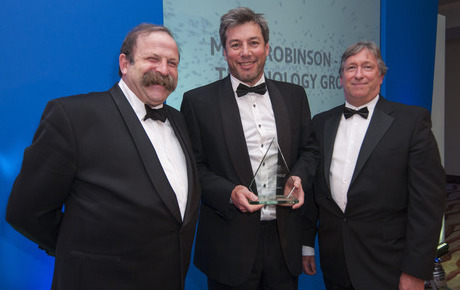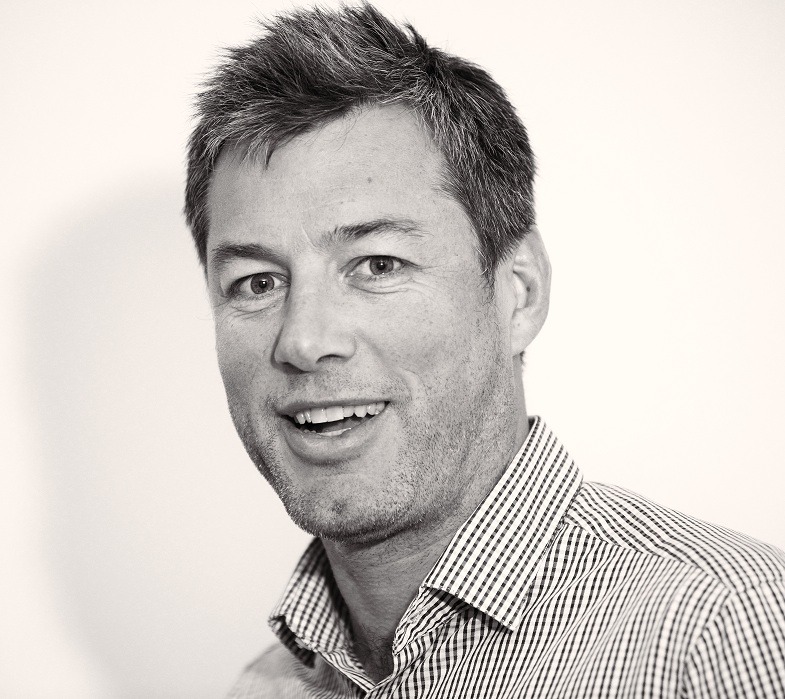An entrepreneur is someone who isn’t afraid to admit that what the business is doing might not be working, and a different direction is required.
Pivoting a business is a time-consuming process fraught with risk, but can open the company up to a new and lucrative revenue stream.
Now imagine doing that multiple times and you’ll soon realise why Mark Robinson scooped Entrepreneur of the Year at the
As a one company man, Robinson has been with APC Technology Group for 28 years – a period which as taken him though the tech bubble and now into an area where the business plan is exploiting the growing need for energy efficient technology.
Robinson joined APC in 1985 as a sales engineering before working his way up to board level by 1992. In 2011 he was made managing director, and then CEO in 2004. While not a typical entrepreneur in the sense that he did not set up the company, the way in which he has gone on to adapt and grow the business displays an undoubted entrepreneurial talent.
Set up as an electronic component distribution organisation, Robinson has seen to it that the business has diversified to take advantage of new and lucrative markets along the way.
‘Look at APC as having an underlying business involving the sale of specialist electronic components,’ he explains.
‘They are small volumes but go into space, transport, medical – basically anywhere that component failure is not an option.’
Changing strategy
In the 1980s when he joined APC the focus quickly shifted to commercial applications, much higher volume and faster moving. After that the business pointed itself towards the data industry, a new wave of technology that it managed to jump onto.
‘We multiplied revenues into the millions and kind of set the scene for what I have been doing for the rest of my career. After data networking moved to China we embraced the new tech wave, the roll out of ISDN.
‘There was a need for a similar component to one that we were selling into the data network industry, but it had to meet standards.’
Through the process of finding a consultant and working on an initial competent for BT (British Telecom), APC developed its first piece of intellectual property (IP).
Over the next six years the business developed ISDN components and then floated off the back of that success in 1996 to give it more development funding.
Cue the entrepreneur in Robinson and a move towards the next wave of leverageable technology, broadband internet. However, as with most good entrepreneurial stories, there needs to be a few hazards along the way.

Mark Robinson picks up his award at the New Energy & Cleantech Awards 2014
APC’s move into broadband and the rise of consumer technology coincided with a collapse in the market which affected businesses across the globe. Securing a host of blue chip companies as clients and carving out a big market share, APC got up to a £100 million market cap – and then the bottom dropped out.
‘We lost 90 per cent over a six-month period, but I wanted to stay listed and use the knowledge I’d gained in developing a market and product, keeping that in house, to looking for the next tech wave.’
The company got back into the distribution business so that it could remain listed, all the time intending to identify the next big thing.
Next big thing
Explaining the new direction, Robinson says, ‘If you turn back the clock five or six years there was a huge debate about global warming – with many identifying people as having a substantial effect.
‘So it just seemed to us and me that once this market got going there was not reason it would stop, while also being one which contained that feel good factor. I could, and still can, turn up and say to a potential client that we’re going to make load of money and also be good for the environment.’
Since 2009 the emphasis has been on maintaining profitable growth and diversification. APC has done this through a series of strategic acquisitions and the creation of subsidiary companies helping customers reduce business energy consumption.
Realising that he couldn’t create a sustainable technology company based on one single product, Robinson set out to create an all-compassing holistic offering.
‘We thought there was a hungry market for products saving on energy spent, but it was much more complex than that and we needed a compelling argument for people to take any action.
‘It was calling out for companies which could go into buildings and offer an overall solution to energy consumption, not one company for one technology and another for something different,’ he adds.
Robinson reveals that APC has the capacity to go into a building and offer any one of six technologies owned in house, with the added benefit for a consultancy-led sale that clearly identifies where energy is being consumed.
The clean technology and energy efficiency offering is now driven through Minimise, a wholly-owned subsidiary of APC. This is then broken down into Minimise Holdings, Minimise, Minimise Energy and Minimise Controls.
Minimise was set up in 2008 and involves the promotion, sale and installation of individual energy efficient technologies such as LED-based lighting. Minimise Energy dates back to 2012 and is focused on the promotion and sale of energy efficient projects, bringing together a range of technologies to reduce carbon footprint through reducing energy demand and/or generating energy more sustainability.
More on the New Energy & Cleantech Awards:
Critical scale
The standout achievement for Robinson and his business during the last year was the signing of a major contract with high street supermarket chain Morrisons.
‘Until recently, Morrisons had been mainly doing lighting. All credit to them, they saw the benefits they could gain by becoming more energy efficient and moved quickly to go into volume before any other chains,’ Robinson says.
‘It’s great of us as it got us out of the blocks and got us a seat at the big table. We’ve now proven that we can provide our product to scale.’
Robinson believes he is not a typical managing director, more someone who is helping create a vision based on a journey now 28 years old.
‘My role is to create an entrepreneurial vision that sets the agenda for where we’re going and then work at the top level to put building blocks in place to exploit that.’
The next year represents one of definite promise. Robinson has just opened offices in Miami and Toronto, cities located in markets which are ‘much bigger’. The Middle East is another region that Robinson believes has huge energy issues.
Robinson’s main ambition however is to own, or at least control, the technologies it markets.
‘We see our strategy as bringing in new innovation whether through university competitions or other sources. We are looking at early-stage technology as well as more proven technology.’
For an entrepreneur who seems to have been part of each major wave of technology during the last 30 years, Robinson finally seems to have settled on one which will provide him with a bit of longevity. The business debate on how best to expand and grow without multiplying carbon footprint looks set to grow and grow.






